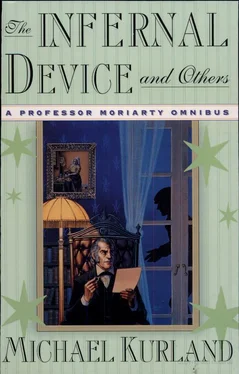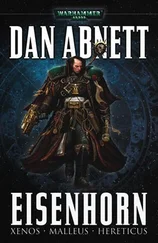"I am sorry, Benjamin," Cecily said.
Slowly Barnett raised his eyes to meet hers. "The Chronicle?" he asked.
"I meant to tell you about that," she said.
SIXTEEN — THE GAME
In a contemplative fashion
And a tranquil frame
of
mind,
Free from every kind
of
passion
Some solution let us find.
— W. S. Gilbert
It is commonly believed that work is anodyne of sorrow: Benjamin Barnett reminded himself of this as he focused his energies on the work at hand. First there was the necessary rearranging of the staff of the American News Service in the absence of Cecily Perrine. Then there was the detail work for Professor Moriarty, as he perfected his plans for the impossible crime. But the sorrow remained. There seemed to be nothing he could do that did not, in some tortuous way, remind him of Cecily. She had left the American News Service office to take a feature reporter's position with the Morning Chronicle. He did not begrudge her that. It was the sort of experience she could not get at the Service. And she was very sincere in wanting the experience. She had taken a cut in salary on accepting the new position.
The American News Service had not actually lost Miss Perrine as a writer, since they were free to buy her stories from the Chronicle for the American wire. But the office was certainly empty without her. Through a conversation with the Chronicle's general manager, who was simultaneously resentful and apologetic about acquiring Cecily Perrine, Barnett found out how and why the job offer was made. The Morning Chronicle suddenly realized that it was in great and immediate need of a female reporter. This discovery was the direct result of Lord Hogbine's having left the sixty-year-old newspaper to his wife in his will. And Lady Hogbine, who had already used much of the unentailed Hogbine fortune to endow an undergraduate ladies' college at Oxford, a home for unwed mothers in Stepney, and a trade school for female typewriter operators in Bethnal Green, was shocked to discover that there were no ladies on the reporting staff of the Morning Chronicle. Cecily Perrine was one of the few experienced reporters who also happened to be a lady.
"She does love me, you understand," he told Moriarty in a confidential conversation in the privacy of the professor's study. "It is the prospect of matrimony that she finds unacceptable. She is not willing to give up her freedom to become any man's wife."
"A sensible girl," Moriarty said. "Wife is the only position of involuntary servitude left in the civilized world since Mr. Lincoln's Emancipation Proclamation."
Barnett snorted and left the room. He had felt the need to confide in someone, but this was not what he wanted to hear.
Moriarty sent Barnett to Plymouth to meet the Hornblower when she docked. "My plans are nearly complete," he said. "But there is certain information that is sketchy or absent. You are a reporter. You have unquestioned access to the various officials and a historical right to ask stupid questions. Find out everything you can about the transportation of the treasure."
"What, exactly, do you want to know?" Barnett asked.
"Details," Moriarty told him. "I want all the picayune, unimportant little details. Everything, no matter how small or seemingly insignificant, is of interest to me."
"Supposing they don't want to tell me anything?" Barnett said. "After all, they will be transporting a priceless treasure. The police and the army may be smart enough to want to keep their exact plans a secret."
"Don't go to the military or police authorities," Moriarty said. "Interview Lord East. He is the sort of busybody who will insist upon knowing every facet of the plan. Actually, he probably formulated the plan himself. He fancies himself awfully clever."
And so Barnett arrived in Plymouth the day before the battleship Hornblower was scheduled to tie up to the military dock. That evening, in his hotel, Lord East allowed himself to be interviewed by the gentlemen of the press. He and his entourage occupied an entire floor, and they seemed to have brought along enough furnishings and paraphernalia to outfit an expedition to Tibet. Lord East was a short, fat man whose once-fair complexion had turned beet-red from years of exposure to the Indian sun. He dressed in the best Savile Row approximation of an oriental potentate, and carried a swagger cane of dark-brown wood, traced with a delicate ivory inlay.
"Always glad to talk to you newspaper wallahs," Lord East told the score of fidgeting reporters who had gathered in his receiving room. He climbed up onto a rattan footstool, which one of his Hindu servants placed carefully in front of his feet. "The average Briton doesn't know nearly enough about the empire we've been carving out for him for the past hundred years. The Indian subcontinent is a vast and fascinating region, more than ten times the size of these little islands. And we have made it ours; sent forth the best we breed, our sons and brothers, and made it ours. We have unified some two hundred petty kingdoms under the British raj. I am proud of my small part in this great achievement."
A stocky man with a great walrus mustache who stood in the left-hand lobe of the flock of reporters raised his hand. "Tell us, your lordship," he called out, "would you say it has been as rewarding for the natives as it has been for the British?"
Lord East looked down at him in annoyance. "What was that?" he asked.
"This conquest," the man said with a slight, undefinable mid-European accent. "These unifications — would you say they have been on the whole good for the native peoples in question? Educational, perhaps?"
"Who are you, sir?" Lord East demanded.
"Heinrich von Hertzog, your lordship. Berliner Tagenblatt."
Lord East struck a pose on his footstool that would have been the envy of many a piece of heroic statuary. "Welcome to England, Mr. Hertzog," he said, his voice carrying a burden of frigid disapproval that is only achieved at the better public schools. "It is certainly a pleasure to have you among us. To answer your question, what's good for Britain is good for the empire. That should be self-evident."
The Berliner Tagenblatt correspondent noted down the answer, and seemed satisfied with it. Even pleased. Perhaps he was picturing how it would sound to his two million Anglophobic German readers. "Thank you, your lordship," he called.
Lord East looked around. "Anything, ah, else?" he asked.
"The treasure, your lordship," called a beefy gentleman in a broadly checked jacket that would have looked more at home on a racecourse tout than a reporter.
Lord East peered down at him. "I didn't know the 'pink 'un' was represented here," he ventured, and smiled broadly when he got the laugh he had been trying for.
"Jameson, your lordship. Daily Telegraph," the beefy reporter said, joining in the general chuckle. "Excuse the inappropriate attire, but I was called here from a rather different assignment."
"Indeed?" Lord East remarked. "I trust you backed a winner." Satisfied that his reputation as a wit was secure, his lordship now struck another pose. "The Lord East Collection," he said, "how can I describe it to you?"
There was a rustling from the crowd, as reporters pulled out their notebooks and licked the points on their pencils.
"India is a land of unbelievable contrasts," his lordship began. "The grandeur of past ages surrounds one in India hidden under the filth and squalor of the present. When I first arrived in Calcutta twelve years ago, as resident director of the Northeastern and Southern Indian Railway, I determined to make it my job to rescue as much of the rapidly disappearing storehouse of irreplaceable knowledge and archaeological beauty as possible. My concern was for the instruction and pleasure of all the people of the empire, and especially the people of India itself, so that they could know their own past before it was eradicated brick by brick. I also strove for the future, so that those who come after us can have some knowledge of those who came before. I have not stinted of my own time or fortune in making these acquisitions, and the result, twenty tons of unique and irreplaceable archaeological treasure, is arriving tomorrow aboard Her Majesty's Battleship Hornblower."
Читать дальше












